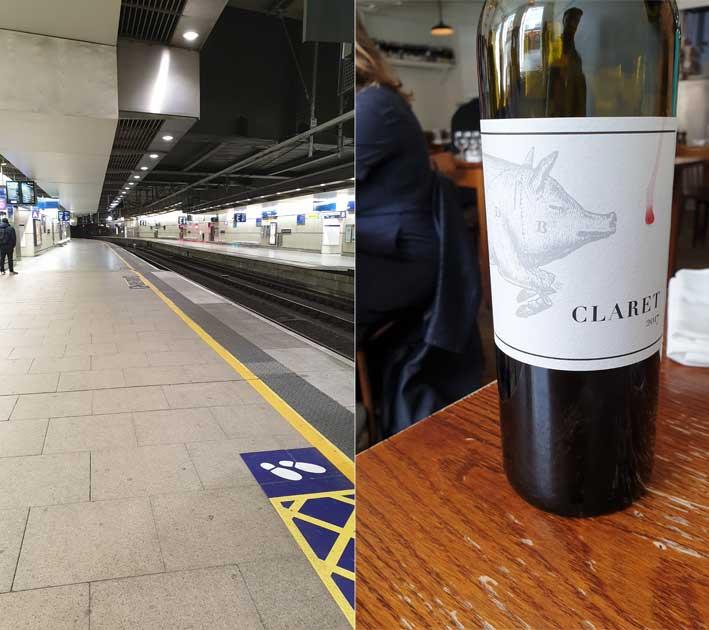"Night approached with a certain reluctance and as I peered out of the window, I saw the evening star, the harbinger of night, and memories flooded back and I sat down to write.
I realised that a year had passed since day 'one'. Involuntarily my pen stopped in its tracks. A whole year in a global pandemic. For us historians, pandemics are paragraphs in books, or somewhat closer to the horror, the remote handwriting in manuscripts.
It dawned on me suddenly as lectures I gave came back to me, lectures where beguiled students took in my words on the charms, delights and suffering of quarantined sailors. Little did I know that what I had expounded with some humour would come to pass in my lifetime. What had been a primary source became a first-hand experience, albeit in a different era with the blessing of the Hypertext Transfer Protocol Secure on the world wide web. It was then I decided to record my first days of living with a raging pandemic.

Provisions at the ready for 14 days of quarantine on a boat
When news of the contagion started to spread across the world my colleagues at Heritage Malta and I were planning a trip to Norway via London. It was part of the ongoing exchange of ideas and works of the Malta Maritime Museum. The project is an ambitious one and will mark a new chapter in the Museum's history. This is not just some cosmetic touches, but a major overhaul never before attempted. It is perhaps proof of the magnitude of the project that Covid accelerated the works rather than hindered them. It showed the world for what it can sometimes be - challenging and hostile. Like an army after years of neutrality, the tranquil world in which we grew up would have left us complacent and unready, had not it been for the audacity of the project.
My usual hard headedness insisted on forging ahead with the travel plans. But hard headedness is not recklessness, and the trip to Norway was cancelled at the last minute as Covid cases started to rise across the globe. But London was to stay, and so I prepared to finish off a number of planned meetings I had there.
The 10th of March 2020 saw me on the tarmac of Luqa airport, whilst WhatsApp messages from well-meaning family and friends buzzed their warnings and last pieces of advice. Armed with hand sanitizer and reeking of alcohol I had not drunk, I sat back to my favourite Ennio Morricone piece and mused: This is just hype. The world has been through worse pandemics than this severe cold. All we need to do is be vigilant.

Left: London’s deserted underground. Right: A bottle of Claret for lunch in London in remembrance of Nelson’s sojourn in Naples.
As I touched down in London things felt different. Yet just like any other metropolis, London refused to quieten down. In March 2020, nobody could convince London to shut the door and stay inside. The underground whizzed me to my rented apartment in Highgate. The meetings proceeded and the only interruption allowed was my usual pilgrimage to the bookstores of London. The commute was conducted in the usual manner, save for the constant sanitizing of my hands. With an eye on my luggage weight limit I bought a prudent supply of books and headed to Spitalfields for lunch with a friend who was living in London at the time. It was a gorgeous lunch, washed down with a bottle of Claret. As always happens the book I was reading inspired my choice of wine. It was about Nelson in Naples, and to my friend's anguish, the topic hogged most of the conversation. We historians tend to carry our passions everywhere, totally oblivious to the fact that not everybody shares them. A rare March sun bathed East London in red. It was to be the last London lunch for a very long time.
Back at the apartment, my phone quivered with bad news: Malta was going into lockdown, book a flight ticket back, things are not safe, the airports will be closing. The bombardment of bad news was too factual to ignore. I decided to cancel the rest of my meetings and catch the first flight out of London.
The journey back was eery and bespoke of things to come. The underground was empty and Gatwick relatively quiet, as if London itself was getting tired. News came through as I boarded the flight back that within 24 hours any passenger returning from London had to quarantine for two weeks. I had just slipped through the deadline but I was haunted by endless episodes of every pandemic our country had been through in 1590, 1675, and 1813. Those pages spoke of vigilance, of complacency being a worse enemy than the contagion. I tend to base life decisions on educated choices of bygone eras and so, in keeping with my choice studies, I decided to undergo quarantine voluntarily, even though I had slipped through the mandatory timeframe. After all, a virus carries no watch and is not partial to calendars. I was determined and it was time to set my plan in motion. I decided to undergo my quarantine days on a boat.
PART 2 will be published next Sunday
Editorial Note: If you wish to contribute your own Covid diary please email [email protected]